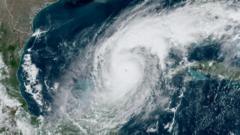Mamadou Taal, a dual UK-Gambian citizen and Cornell University graduate student, has opted to leave the US after his visa was revoked due to his participation in protests against Israel during the recent Israel-Gaza conflict. He previously sought legal help to block his deportation, but ultimately decided to leave, citing fears for his safety and a lack of faith in the judiciary. Taal's case aligns with a broader trend under the Trump administration targeting international students involved in protests, resulting in widespread visa revocations.
Cornell Student Exits US Amid Trump Administration's Visa Crackdown

Cornell Student Exits US Amid Trump Administration's Visa Crackdown
Mamadou Taal, a Cornell University graduate student, departs from the US after facing visa revocation linked to pro-Palestinian protest activities, reflecting a growing trend of international students leaving due to stringent immigration policies.
A Cornell University graduate student has made the decision to leave the United States instead of facing deportation, following the revocation of his visa due to his involvement in protests against Israel. Mamadou Taal, a dual citizen of the UK and The Gambia, became a focal point of controversy amid heightened tensions stemming from the Israel-Gaza war last year.
In a post shared on X, Taal announced his decision to leave, stating, "free and with my head held high." This choice comes after a judge denied his request to delay his deportation process, prompting Taal to seek an exit on his own terms. "Given what we have seen across the United States, I have lost faith that a favourable ruling from the courts would guarantee my personal safety and ability to express my beliefs," he expressed.
Taal’s activism did not go unnoticed at Cornell, where he faced suspension two times related to his protest actions. On the day of a significant attack by Hamas on Israel, he had posted, “Glory to the Resistance,” indicating his support for the armed struggle in Palestine during a rally.
Reports suggest over 300 students have had their visas revoked in relation to pro-Palestinian demonstrations, as noted by Secretary of State Marco Rubio. The Trump administration has framed these measures as necessary actions against individuals deemed "adversarial to the foreign policy and national security interests" of the United States, citing the Immigration and Nationality Act.
Critics contend that such deportations infringe upon the rights to free speech and a safe academic environment. Another student affected by similar circumstances, Indian researcher Ranjani Srinivasan, expressed her desire to clear her name and continue her studies, underscoring the broader implications these visa policies have on international students.
The current situation reflects an ongoing clash between activism and government policies under the Trump administration, which has actively sought to address what it defines as antisemitic behavior through legal mechanisms, including a recent executive order focusing on curbing such actions.





















